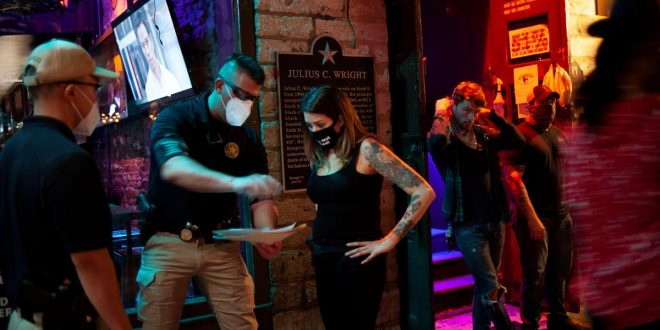PHOENIX (Reuters) – Several U.S. states including Oklahoma reported a surge in new coronavirus infections on Wednesday, just days before a planned campaign rally for President Donald Trump in Tulsa that will rank as the nation’s largest social gathering by far in three months.
An uptick in coronavirus cases in many states over the past two weeks, along with rising COVID-19 hospitalizations, reflected a troubling national trend that has seen daily U.S. infection numbers climbing after more than a month of declines.
Oklahoma reported a record 259 new cases over the previous 24 hours, while Florida reported more than 2,600 new cases and Arizona more than 1,800 – the second-highest daily increases for those two states.
In Arizona, where doctors, nurses and health administrators called for making face coverings mandatory statewide in public places, Governor Doug Ducey said he would let local officials decide whether to impose such rules and how to enforce them.
“If you do go out, wear a mask. It’s the smart thing to do,” he said.
Phoenix Mayor Kate Gallego immediately tweeted that a vote on a proposed ordinance to require face masks outdoors in the nation’s fifth-largest city would go on the agenda for the city council’s next meeting.
Texas reported 3,100 new coronavirus cases on Wednesday, its biggest single-day tally yet, along with another all-time high for COVID-19 hospitalizations – nearly 2,800 patients. That marks the sixth straight day in which the number of patients currently admitted for the highly contagious respiratory virus has reached record numbers in Texas.
While Texas has not reported how many of its hospitalized COVID-19 patients are admitted to intensive care units, 1,500 ICU beds are available statewide, including 200 in the Houston area, a state website (here) said.
The daily count of infections also hit a new benchmark in California, with more than 4,000 cases recorded statewide on Wednesday. Los Angeles County alone reported its largest daily increase of over 2,100 new cases on Wednesday, though several hundred were attributed to a backlog in test results released all at once.
Trump’s political team, meanwhile, forged ahead with plans for a campaign rally on Saturday in Tulsa, his first such event since stay-at-home restrictions were imposed across much of the country in March to fight the coronavirus.
Trump’s campaign advisers see the event as a chance to rejuvenate his political base after a string of national and state opinion polls showed the president trailing Democratic rival Joe Biden.
Public health experts worry that assembling a crowd of 20,000 shouting, chanting people inside an arena – particularly if many aren’t wearing masks – could turn the rally into a coronavirus “super-spreader event.”
“Ultimately, the president doesn’t ask for permission before he” goes to places, Oklahoma Governor Kevin Stitt said during a briefing on Wednesday. “So we found out that the president was coming, so we are going to make sure it’s the best and as safe as possible.”
Oklahoma health officials recommend anyone attending the rally to get tested for the coronavirus before arriving, then to self-isolate afterward and get tested again. The health commissioner urged those at high risk of severe illness from COVID-19 – senior citizens and people with chronic underlying health conditions – to stay home.
Vice President Mike Pence on Tuesday said officials were considering other, possibly outdoor, venues for the Tulsa event.
Biden accused Trump of “surrendering” to the coronavirus pandemic and failing to stay prepared for a resurgence that could put a U.S. economic recovery at risk.
HOSPITALS FILLING
In most of the states where cases are spiking, COVID-19 hospitalizations are also rising or at record highs. Unlike increases in new infections, rising hospitalizations cannot simply be attributed to greater testing.
In Arizona, 83% of intensive care beds are occupied, a record high, according to a state website (here). The outbreak has alarmed the hard-hit Navajo Nation. The Navajo reservation – overlapping parts of Arizona, Utah and New Mexico – reinstated a weekend-long curfew that closes even essential businesses like grocery stores and gas stations.
In Florida, some of the increase has been linked to newly reopened bars, making for easy virus transmission. In one case, 16 friends who celebrated a birthday at a bar without wearing masks all tested positive, according to media reports.
FILE PHOTO: Bar manager at The Jackalope talks with agents from the Texas Alcoholic Beverage Commission as they check that bars are maintaining social distancing protocols to help slow the spread of the coronavirus disease (COVID-19), on the first day that bars in Texas were allowed to reopen after they were shut down in March, in Austin, Texas, U.S. May 22, 2020. REUTERS/Nuri Vallbona
Texas has also pointed to bars as one cause of its current outbreak. In Oregon, over 200 new cases were tied to events at a single church.
For the United States as a whole, more than 2.1 million people are known to have been infected to date, including 117,000 who have died from COVID-19, by far the most of any country in the world.
(Open tmsnrt.rs/2WTOZDR in an external browser for a Reuters interactive)
Additional reporting by Brendan O’Brien in Chicago, Peter Szekely in New York, Jarrett Renshaw in Philadelphia, Ernest Scheyder in Tusla, Oklahoma, and Andrew Hay in Taos, New Mexico; Writing by Lisa Shumaker; Editing by Leslie Adler; Editing by Bill Berkrot
 The Argus Report Read about it!
The Argus Report Read about it!





